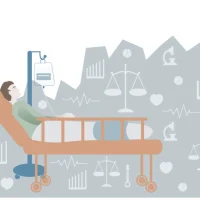HealthManagement, Volume 18 - Issue 1, 2018

The way forward for US healthcare
Experts draw their conclusions on the American health system and what needs to be done to eradicate the many problems that continue to manifest.
In a recently published book, health leaders Dr. Denis Cortese and Antony Bell offer a radical overview of the dissatisfaction of the American healthcare quagmire and enlist ways which would dissolve the many problems that exist.
According to the leaders, the American healthcare delivery system is breaking and beyond fixing. In their book they explain that the only way out of this quandary is leadership itself. The book titled "Rescuing healthcare: A leadership prescription to make healthcare what we all want it to be," was released in 2017 and explains the main ways the healthcare system is so flawed; so much so that it is commonly fought over by politicians, debated endlessly by people all over the country and yet no real changes are enacted.
Cortese, a Foundation professor at Arizona State University and former president and CEO of the Mayo Clinic, and Bell, CEO of Leader Development Inc., a firm that helps leaders in several sectors transform their organisation, believe that the only way for the healthcare system to get back on track and provide quality care at a reasonable cost, is for medical practitioners to be empowered. This will allow them to create meaningful change for both the system and what matters the most: patients.
In a recent interview, Dr. Cortese and Antony Bell speak to HealthManagement.org about their book and what visionary leadership means to them.
What else is needed from senior politicians in order to improve the healthcare system within the U.S?
A clear vision for what they want out of healthcare. 100% coverage is needed; high-value healthcare delivery; a learning organisation for healthcare in the USA (so that everyone in the healthcare system knows what the system knows); and if they want high value care they should have systems of payments that are related to high value – not fee for service.
For example: “Insurance for all” should mean that all US citizens are in the same programme. This could mean a single government payer such as Medicare or it can mean that the US citizens get the same insurance programme that all our Federal employees and politicians have - the Federal employees benefit plan. This is a government-regulated programme; with financial assistance from the government for those who need it; and freedom of multiple insurance private plans. Leadership means leading – and this means that EVERYONE is in the same insurance programme together.
What does it mean to be a successful leader today?
Let us summarise key points from our book (Rescuing healthcare: a leadership prescription to make healthcare what we all want it to be) as follows:
a. personal traits – high moral and ethical character; leadership competence. One without the other will fail. Unfortunately, we have little of both today in the leaders we hear most about
b. skills in at least three domains of leadership:
organisational leadership skills – create visions and direction; sell and communicate the vision; align the organisation; select people and delegate responsibilities
operational leadership skills – planning, organising, measuring, setting goals, setting incentives
people skills: selecting and matching the right people; explaining and clarifying; motivating and developing people
c . dealing with several elements of leadership simultaneously and over time. Shared vision; shared reality; strategy; tactics; culture and alignment; skills of the staff; technology; implementation.
How is this "shared vision" to be implemented?
In the field of healthcare, the “organisational” leader will need to work with a small group of key leaders to successfully develop a vision that they will all support. Of course the organisational leader will play a major role in the vision but has to be prepared to modify preconceived ideas as the team develops ideas that are even better and more appropriate. Once the vision is clarified the hard work begins – relentless communication to all the staff and all the employees. The communication needs to be repeated as often as needed and in as many settings as possible until the employees and professional staff begin to think that the vision was all their idea.
How do you think this vision differs from other healthcare systems around the world, aside from it being a pay-for-service system?
The vision of high value healthcare – best outcomes, highest safety, best service and at lowest costs is the vision for healthcare in the world. And it has to be accompanied by a payment system that keeps the best providers in business. It is very unlikely that a traditional fee for service system will ever accomplish that goal. New models of payment in the USA might, such as: bundled payments, capitation, or providers owing their own health insurance plans.
Do you think there is a serious issue of burnout amongst US healthcare staff?
Yes, indeed. All the so called stakeholders in the USA have found ways to reduce their administrative work loads, and sell more of their products by shifting all responsibility and accountability to providers. Who, over time, have become overburdened with required or regulated activities that have nothing to do with direct patient care. Who wouldn’t experience burnout?
In order for healthcare to be financially sustainable, what are the most important factors that come into play?
To relentlessly seek out the highest value care and reimburse those providers in such a way that they can remain in business. For instance: use reality pricing based on the very highest quality providers who are able to keep their costs down. Then pay in such a way that they can cover their costs and accomplish a 2-4% profit. Even non-profits must make some money to remain in business, innovate, replenish/replace their facilities. A new regulatory mindset has to come into being, such as we see in regulated utilities that provide a critical societal need (electricity, water, etc.).
"Rescuing healthcare: a leadership prescription to make healthcare what we all want it to be" is published
by Morgan James publishing.





